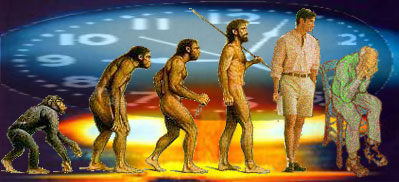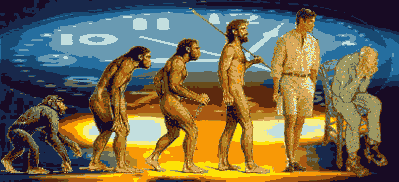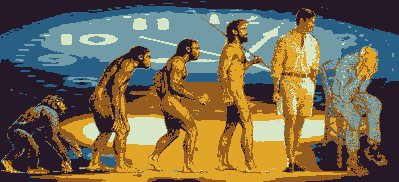All the Time In the World

by William Stone, III
|
The elimination of government is human creativity unchained.
Under any form of government, individuals aren't free to persue their own best
interests. For example, far too much of my time is spent on projects designed
to teach others the benefits of embracing the Zero Aggression Principle. I'm
writing a book on the ZAP. I formed an organization devoted to popularizing
and teaching the ZAP. I write weekly columns that revolve around the ZAP. I
engage in private e-mail discussions about aspects of the ZAP.
These projects represent the majority of my waking time not spent keeping my
family supported in the manner to which they've become accustomed. What pet
projects would I have, if only the philosophical state of the world didn't
demand my attention elsewhere? What pet projects would others have, freed
from the oppressive demands of government?
|
 Here's one thing I'd be doing if I didn't have to fight for a free society:
researching subjective time sense therapy.
As anyone over age 30 can attest, an individual's subjective perception of the
passage of time contracts with age. It's a common topic among middle-aged
and older people that "time seems to go by so quickly, these days!"
In many ways, I envy the subjective passage of time experienced by my two
burgeoning libertarian daughters, presently aged seven and nine. Both
complain about the length of time necessary to drive between our home in
McCook Lake, South Dakota to Sioux Falls. This is about a fifty minute drive
at safe speeds (approximately 90mph), and one that we undertake for family
outings from time to time. The girls will uniformly complain that the trip
is taking FOREVER: from my perspective, it's barely an inconvenience.
Many individuals ignore such complaints from children as inexperience and lack
of perspective. Such casual dismissal overlooks that the key to the problem
of time contraction is, in fact, EXPERIENCE.
The phenomenon of time contraction is reported universally, across most
cultures and ethnicities: as one ages, time seems to pass much more rapidly
- and it gets worse the older one gets.
Here's one thing I'd be doing if I didn't have to fight for a free society:
researching subjective time sense therapy.
As anyone over age 30 can attest, an individual's subjective perception of the
passage of time contracts with age. It's a common topic among middle-aged
and older people that "time seems to go by so quickly, these days!"
In many ways, I envy the subjective passage of time experienced by my two
burgeoning libertarian daughters, presently aged seven and nine. Both
complain about the length of time necessary to drive between our home in
McCook Lake, South Dakota to Sioux Falls. This is about a fifty minute drive
at safe speeds (approximately 90mph), and one that we undertake for family
outings from time to time. The girls will uniformly complain that the trip
is taking FOREVER: from my perspective, it's barely an inconvenience.
Many individuals ignore such complaints from children as inexperience and lack
of perspective. Such casual dismissal overlooks that the key to the problem
of time contraction is, in fact, EXPERIENCE.
The phenomenon of time contraction is reported universally, across most
cultures and ethnicities: as one ages, time seems to pass much more rapidly
- and it gets worse the older one gets.
 As is the case with some aspects of the Zero Aggression Principle, I find that
my background gives me some unique insights in this regard. I began my adult
life as a professional actor. This included a great deal of training in stage
movement, particularly becoming familiar with one's senses and body.
Actors have a saying, almost like a mantra: "Be in the moment." This is a
reference to the fact that (in the words of my old acting guru, the late Dr.
William Morgan), "Theater is planned, rehearsed spontaneity." Actors learn
their lines, their blocking, and their characterization in an attempt to
appear as though - night after night - the events being experienced by their
character are happening for the first time.
Obviously, it's NOT happening for the first time. Consequently, a common
problem for actors is to spend so much time internally anticipating the "big
speech" five minutes into the future that they'll neglect whatever might be
happening in the present.
Hence the phrase, "Be in the moment." Concentrate on what's happening NOW,
not what you're expecting to happen five minutes from now. Five minutes from
now is when you should be concentrating on that.
As I've aged, I've discovered that it's increasingly difficult to "be in the
moment." There appears to be a very simple reason why this is the case. It
is, I believe, the key to the subjective time sense:
Over time, the mind ceases to pay conscious attention to repetitive sensory
input. In theatrical terms, the mind "edits out" unimportant data.
For example, individuals living in a large metropolitan area aren't aware of
the constant background noises of the city. To be constantly aware of random
background noise would drive one insane. The mind simply "edits it out" from
conscious thought, only taking note when something unusual occurs, such as a
nearby police siren.
When I moved back to my home state of South Dakota after a decade spent in
Chicago, I found that it took a couple of weeks for my mind to deal with the
relative silence of my McCook Lake home. It had become accustomed to
"editing out" far more background noise than that generated by a near-country
lot.
After only a couple of months in South Dakota, a business trip took me to San
Francisco. I was positively shocked at how hard it was to sleep in my
downtown hotel room. In that short period of time, my mind had grown
completely unaccustomed to city noises and was no longer prepared to
automatically "edit them out."
Similarly, I had occasion to spend the summer of 1988 living and working in
Clinton, Iowa. Clinton is home to a large corn processing plant. As anyone
who's ever passed such a plant can tell you, there is an unmistakable -- and
somewhat unpleasant - odor that accompanies it. The plant in Clinton
produces a smell that covers a large part of the town.
I noticed the smell the first couple of days' living there. In short order,
my mind began to "edit out" the smell as inconsequential. I became
completely unaware of it, reminded of it only after returning to Clinton
after a weekend excursion to Chicago.
As is the case with some aspects of the Zero Aggression Principle, I find that
my background gives me some unique insights in this regard. I began my adult
life as a professional actor. This included a great deal of training in stage
movement, particularly becoming familiar with one's senses and body.
Actors have a saying, almost like a mantra: "Be in the moment." This is a
reference to the fact that (in the words of my old acting guru, the late Dr.
William Morgan), "Theater is planned, rehearsed spontaneity." Actors learn
their lines, their blocking, and their characterization in an attempt to
appear as though - night after night - the events being experienced by their
character are happening for the first time.
Obviously, it's NOT happening for the first time. Consequently, a common
problem for actors is to spend so much time internally anticipating the "big
speech" five minutes into the future that they'll neglect whatever might be
happening in the present.
Hence the phrase, "Be in the moment." Concentrate on what's happening NOW,
not what you're expecting to happen five minutes from now. Five minutes from
now is when you should be concentrating on that.
As I've aged, I've discovered that it's increasingly difficult to "be in the
moment." There appears to be a very simple reason why this is the case. It
is, I believe, the key to the subjective time sense:
Over time, the mind ceases to pay conscious attention to repetitive sensory
input. In theatrical terms, the mind "edits out" unimportant data.
For example, individuals living in a large metropolitan area aren't aware of
the constant background noises of the city. To be constantly aware of random
background noise would drive one insane. The mind simply "edits it out" from
conscious thought, only taking note when something unusual occurs, such as a
nearby police siren.
When I moved back to my home state of South Dakota after a decade spent in
Chicago, I found that it took a couple of weeks for my mind to deal with the
relative silence of my McCook Lake home. It had become accustomed to
"editing out" far more background noise than that generated by a near-country
lot.
After only a couple of months in South Dakota, a business trip took me to San
Francisco. I was positively shocked at how hard it was to sleep in my
downtown hotel room. In that short period of time, my mind had grown
completely unaccustomed to city noises and was no longer prepared to
automatically "edit them out."
Similarly, I had occasion to spend the summer of 1988 living and working in
Clinton, Iowa. Clinton is home to a large corn processing plant. As anyone
who's ever passed such a plant can tell you, there is an unmistakable -- and
somewhat unpleasant - odor that accompanies it. The plant in Clinton
produces a smell that covers a large part of the town.
I noticed the smell the first couple of days' living there. In short order,
my mind began to "edit out" the smell as inconsequential. I became
completely unaware of it, reminded of it only after returning to Clinton
after a weekend excursion to Chicago.
 By age thirty or so, most daily sensory input has been experienced millions
of times. The feel of a cool breeze, the aromas accompanying daily life, the
route to one's drive to work. Anything one can experience repetitively
becomes unimportant to the mind, and is simply "edited out" of conscious
thought.
The "editing out" of sensory input from conscious thought causes the brain to
compensate for the increased "downtime" by decreasing the apparent passage of
time between meaningful events. Hence, as an individual ages, the more
repetitive sensory input is "edited out," and time seems to be passing more
rapidly.
The solution to this problem is very simple in theory, but difficult in
practice. It requires exercises designed to put one's mind "into the
moment," the way that an actor can remind himself to concentrate on what's
going on right now as opposed to what's coming up in five minutes.
Such exercises already exist in the theatrical world, but are sadly beyond
the scope of a limited essay such as this. To my knowledge, they've never
been applied to this problem, other than anecdotally. I use these techniques
to increase or decrease my subjective perception of time passage at will.
During a long car trip, I contract the passage of time. Conversely,
during a family outing, I can increase it.
Were we in a free society in which individuals self-govern guided by the Zero
Aggression Principle, I would formalize the "Stone Theory of Subjective Time
Perception." I'd form a company devoted to researching the phenomenon
scientifically, proving my theory if possible, and then formalizing techniques
for treating it.
In the process, I'd make millions of dollars for myself and my investors.
How much would the population of a free society pay for a far longer
subjective lifespan? Indeed, were it not for government, I could probably
make millions re-training elderly individuals in the present unfree society.
Unfortunately, government creates artificially high barriers to entry into
scientific fields. This essentially prevents an educated layman from
practicing in any creditable way. No doubt I could find some interest among
the practitioners of holistic medicine, but there are problems with this. Not
all holistic disciplines have scientific merit, and association with such can
make one appear less credible.
In a free society, I'd simply have my idea, convince enough backers that it
was worthwhile, conduct repeatable scientific testing, and get on with
pioneering a new field of scientific endeavor.
That's what I'd do if I lived in a free society in which individuals
self-govern guided by the Zero Aggression Principle. What would you do?
What other breathtaking advances in science and human achievement are waiting
behind the creative power of millions of free individuals?
Human creativity - and everything it promises - is currently shackled by
government. It is imperative that when the present US FedGov falls that we
follow the lead of Somalia and replace it with nothing.
By age thirty or so, most daily sensory input has been experienced millions
of times. The feel of a cool breeze, the aromas accompanying daily life, the
route to one's drive to work. Anything one can experience repetitively
becomes unimportant to the mind, and is simply "edited out" of conscious
thought.
The "editing out" of sensory input from conscious thought causes the brain to
compensate for the increased "downtime" by decreasing the apparent passage of
time between meaningful events. Hence, as an individual ages, the more
repetitive sensory input is "edited out," and time seems to be passing more
rapidly.
The solution to this problem is very simple in theory, but difficult in
practice. It requires exercises designed to put one's mind "into the
moment," the way that an actor can remind himself to concentrate on what's
going on right now as opposed to what's coming up in five minutes.
Such exercises already exist in the theatrical world, but are sadly beyond
the scope of a limited essay such as this. To my knowledge, they've never
been applied to this problem, other than anecdotally. I use these techniques
to increase or decrease my subjective perception of time passage at will.
During a long car trip, I contract the passage of time. Conversely,
during a family outing, I can increase it.
Were we in a free society in which individuals self-govern guided by the Zero
Aggression Principle, I would formalize the "Stone Theory of Subjective Time
Perception." I'd form a company devoted to researching the phenomenon
scientifically, proving my theory if possible, and then formalizing techniques
for treating it.
In the process, I'd make millions of dollars for myself and my investors.
How much would the population of a free society pay for a far longer
subjective lifespan? Indeed, were it not for government, I could probably
make millions re-training elderly individuals in the present unfree society.
Unfortunately, government creates artificially high barriers to entry into
scientific fields. This essentially prevents an educated layman from
practicing in any creditable way. No doubt I could find some interest among
the practitioners of holistic medicine, but there are problems with this. Not
all holistic disciplines have scientific merit, and association with such can
make one appear less credible.
In a free society, I'd simply have my idea, convince enough backers that it
was worthwhile, conduct repeatable scientific testing, and get on with
pioneering a new field of scientific endeavor.
That's what I'd do if I lived in a free society in which individuals
self-govern guided by the Zero Aggression Principle. What would you do?
What other breathtaking advances in science and human achievement are waiting
behind the creative power of millions of free individuals?
Human creativity - and everything it promises - is currently shackled by
government. It is imperative that when the present US FedGov falls that we
follow the lead of Somalia and replace it with nothing.
- –
William Stone, III

William Stone, III is a computer
nerd (RHCE, CCNP, CISSP) and philosopher of the Zero Aggression Principle from McCook Lake, South
Dakota. He seeks the Libertarian Party's nomination for the 2004 Senate race
is South Dakota.
Contact:
Webmaster
© William Stone & Associates,
All Rights Reserved.
|
| Dear American People |
Index |
On the consequences of the US-led invasion of Iraq |
|




